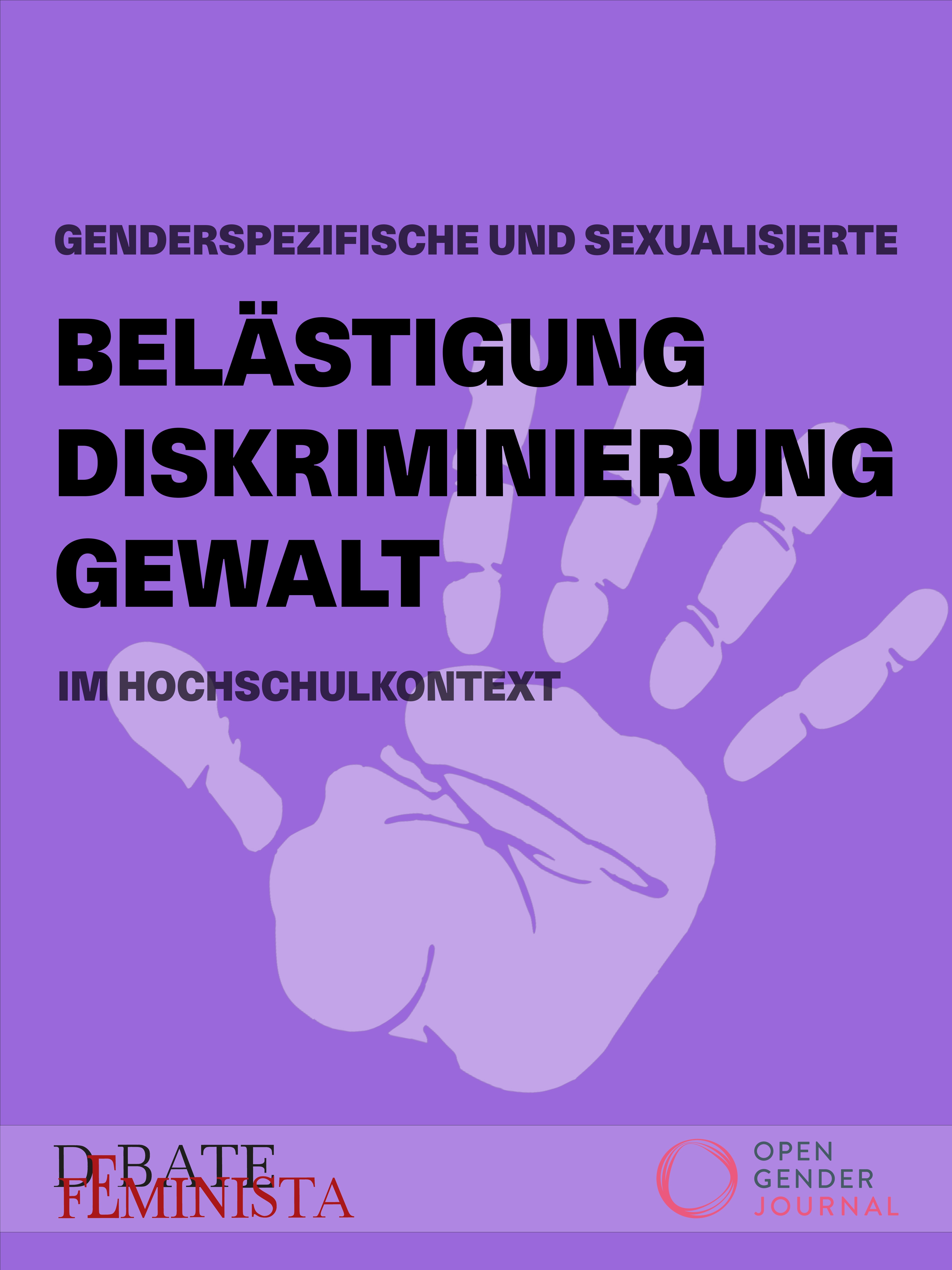Looking Askance and Envy
Subtle Gender Violence in the Neoliberalised Academia
DOI:
https://doi.org/10.17169/ogj.2023.245Keywords:
Colombia, Gender Violence, Neoliberalism, UniversityAbstract
This article shows how envy is a form of subtle gender violence within academia. Women professors at the National University of Colombia that participated in this study perceive that they are envied for their academic production within an androcentric system that devalues the knowledge and contributions of women. This occurs in a neoliberal context of scarcity of resources that hinders research and scientific production, but economically stimulates those who produce academic output. Thus, the perception of the envy resulting from professional development leads to sinuous relationships among colleagues, leading women professors to self-isolation. At the same time, this also has consequences for their students, since one way of harming the professors is by obstructing the academic progress of people close to them.
References
Acker, Joan (1990): Hierarchies, Jobs, Bodies. A Theory of Gendered Organizations. In: Gender and Society, 4 (2), 139–158. doi: 10.1177/089124390004002002
Acker, Sandra (1994): Género y educación. Reflexiones sociológicas sobre las mujeres, la enseñanza y el feminismo. Madrid: Narcea.
Ahmed, Sara (2004): The Cultural Politics of Emotion. Edinburgh: Edinburgh University Press.
Blazquez Graf, Norma/Bustos Romero, Olga (2013): Saber y poder. Testimonios de directoras de la UNAM. Ciudad de México: Centro de Investigaciones Interdisciplinarias de Ciencias y Humanidades, UNAM.
Buquet, Ana/Cooper, Jennifer A./Mingo, Araceli/Moreno, Hortensia (2013): Intrusas en la Universidad. Ciudad de México: Programa Universitario de Estudios de Género & Instituto de Investigaciones sobre la Universidad y la Educación, UNAM.
Cannizzo, Fabian (2018): Tactical Evaluations. Everyday Neoliberalism in Academia. In: Journal of Sociology, 54 (1), 77–91. doi: 10.1177/1440783318759094
Castelao-Huerta, Isaura (2022): The Discreet Habits of Subtle Violence. An Approach to the Experiences of Women Full Professors in Neoliberal Times. In: Gender and Education, 34 (2), 216–230. doi: 10.1080/09540253.2020.1815660
Castelao-Huerta, Isaura (2021a): Efectos problemáticos de la neoliberalización de las universidades públicas en Colombia. In: Uni-Pluriversidad, 21 (1), 1–18. doi: 10.17533/udea.unipluri.21.1.03
Castelao-Huerta, Isaura (2021b): Investigaciones sobre los efectos de la neoliberalización de la educación superior pública en América Latina. In: Educação e Pesquisa, 47, 1–24. doi: 10.1590/s1678-4634202147232882
Charmaz, Kathy (1996): Grounded Theory. In: Smith, Jonathan A./Harre, Rom/van Langenhove, Luk (Ed.): Rethinking Methods in Psychology. London: Sage Publications, 27–49. doi: 10.4135/9781446221792.n3
Clark, Cynthia M./Olender, Lynda/Kenski, Diane/Cardoni, Cari (2013): Exploring and Addressing Faculty-to-Faculty Incivility. A National Perspective and Literature Review. In: Journal of Nursing Education, 52 (4), 211–218. doi: 10.3928/01484834-20130319-01
Cleary, Michelle/Walter, Garry/Halcomb, Elizabeth/Lopez, Violeta (2016): An Examination of Envy and Jealousy in Nursing Academia. In: Nurse Researcher, 23 (6), 14–19. doi: 10.7748/nr. 2016.e1405
Cummis, Helene (2012): Queen Bees and Mommy Tracking. How’s an Academic Woman Supposed to Get Ahead? In: Advancing Women in Leadership, 32, 79–91. doi: 10.21423/awlj-v32.a90
Della Corte, Elisabetta (2014): La envidia en el trabajo. Entre la competencia y la destrucción. Microfísica de la envidia. In: Revista Latinoamericana de Estudios Sobre Cuerpos, Emociones y Sociedad, 15 (6), 53–64.
Diezmann, Carmel/Grieshaber, Susan (2019): Women Professors. Singapore: Springer. doi: 10.1007/978-981-13-3685-0
East, Martin P./Watts, Fraser N. (2005): Jealousy and Envy. In: Dalgleish, Tim/ Power, Mick J. (Ed.): Handbook of Cognition and Emotion. Chichester: John Wiley & Sons, 569–588. doi: 10.1002/0470013494.ch27
Fassbender, Dina Sophie/Silva Díaz, John Alexander (2014): ¿Pago por rendimiento? Una discusión de las políticas de incentivación de la productividad académica en Colombia y Alemania. In: Revista Papeles, 6 (11), 10–19.
Flores-Hernández, Aurelia/Espejel-Rodríguez, Adelina/Martell-Ruíz, Luz María (2016): Discriminación de género en el aula universitaria y en sus contornos. In: Ra Ximhai, 12 (1), 49–67. doi: 10.35197/rx.12.01.2016.03.af
Flores Garrido, Natalia/Nava Bolaños, Isalia/Ortiz Romero, Edith/García Pareja, Tania Elena (2017): Trabajo doméstico y de cuidados. Un análisis de las poblaciones académica, administrativa y estudiantil de la UNAM. Ciudad de México: Centro de Investigaciones Interdisciplinarias de Ciencias y Humanidades, UNAM. doi: 10.22201/cieg.9786070292347e.2017
Gartner, Rachel E./Sterzing, Paul R./Fisher, Colleen M./Woodford, Michael R./Kinney, M. Killian/Victor, Bryan G. (2020): A Scoping Review of Measures Assessing Gender Microaggressions Against Women. In: Psychology of Women Quarterly, 44 (3), 283–306. doi: 10.1177/0361684320920834
Hacker, Peter (2017): The Passions. A Study of Human Nature. Chichester: Wiley. doi: 10.1002/9781118951866
Henderson, Emily F. (2019): On Being the ‘Gender Person’ in an Academic Department. Constructions, Configurations and Implications. In: Journal of Gender Studies, 28 (6), 730–742. doi: 10.1080/09589236.2019.1620709
Howe-Walsh, Liza/Turnbull, Sarah (2016). Barriers to Women Leaders in Academia. Tales from Science and Technology. In: Studies in Higher Education, 41 (3), 415–428. doi: 10.1080/03075079.2014.929102
Hudak, Glenn M. (2000): Envy and Goodness in Academia. In: Peace Review, 12 (4), 607–612. doi: 10.1080/10402650020014717
Jaramillo Salazar, Hernán/Botiva, María Alejandra/Zambrano, Andrés (2004): Políticas y resultados de ciencia y tecnología en Colombia. https://repository.urosario.edu.co/handle/10336/11295 (29/11/2018).
Landweer, Hilge (2020): Aggressive Emotions. From Irritation to Hatred, Contempt and Indignation. In: Szanto, Thomas/Landweer, Hilge (Ed.): The Routledge Handbook of Phenomenology of Emotion. Oxon: Routledge, 441–454. doi: 10.4324/9781315180786-43
Lee, Laura J./Leonard, Curtis A. (2001): Violence in Predominantly White Institutions of Higher Education. In: Journal of Human Behavior in the Social Environment, 4 (2–3), 167–186. doi: 10.1300/J137v04n02_09
Lipton, Briony (2020): Academic Women in Neoliberal Times. Cham: Springer International Publishing. doi: 10.1007/978-3-030-45062-5
Macfarlane, Bruce (2016): Collegiality and performativity in a competitive academic culture. In: Higher Education Review, 48 (2), 31–50.
Martínez Covarrubias, Sara (2006): Mujeres y universidad. Vidas académicas. Colima: Universidad de Colima.
Molina-Molina, Silvia/De-Moya-Anegón, Félix (2013): Política nacional y visibilidad internacional. El caso colombiano. In: El Profesional de la Información, 22 (6), 529–536. doi: 10.3145/epi.2013.nov.05
Moreno, Hortensia/Mingo, Araceli (2019): Temor, desprecio y deseo como figuras del sexismo en la universidad. In: Nómadas, 51, 13-29. doi: 10.30578/nomadas.n51a1
Morley, Louise/Crossouard, Barbara (2016): Gender in the Neoliberalised Global Academy: The Affective Economy of Women and Leadership in South Asia. In: British Journal of Sociology of Education, 37 (1), 149–168. doi: 10.1080/01425692.2015.1100529
Ortiz Gómez, María Guadalupe (2014): El perfil del ciudadano neoliberal. La ciudadanía de la autogestión neoliberal. In: Sociológica, 29 (83), 165–200.
Parrott, W. Gerrod/Rodriguez Mosquera, Patricia M. (2008): On the Pleasures and Displeasures of Being Envied. In: Smith, Richard (Ed.): Envy. Theory and Research. New York: Oxford University Press, 117–132. doi: 10.1093/acprof:oso/9780195327953.003.0007
Pereira, Maria do Mar (2017): Power, Knowledge and Feminist Scholarship. An Ethnography of Academia. Oxon: Routledge. doi: 10.4324/9781315692623
Rossiter, Margaret W. (1993): The Matthew Matilda Effect in Science. In: Social Studies of Science, 23 (2), 325–341. doi: 10.1177/030631293023002004
Sandoval, Eduardo/Peña, Juan Carlos (2019): Violencia de género y discriminación arbitraria en una universidad privada chilena. Una exploración inicial. In: Sophia-Educación, 15 (2), 55–70. doi: 10.18634/sophiaj.15v.2i.945
Scher, Murray/Stevens, Mark (1987): Men and Violence. In: Journal of Counseling and Development, 65 (7), 351–355. doi: 10.1002/j.1556-6676.1987.tb00729.x
Segato, Rita Laura (2003): La argamasa jerárquica. Violencia moral, reproducción del mundo y eficacia simbólica del derecho. In: Série Antropologia, 332. http://repositorio.ciem.ucr.ac.cr/jspui/handle/123456789/150 (03/09/2018).
Smith, Richard H./Combs, David J. Y. (2010): Envy. In: Weiner, Irving B./Craighead, W. Edward (Ed.): The Corsini Encyclopedia of Psychology. Hoboken: John Wiley y Sons, Inc. doi: 10.1002/9780470479216.corpsy0312
Strongman, Kenneth T. (2003): Jealousy and Envy. From Everyday Life to Theory. Chichester: Wiley.
Tábora Tirado, Wanda I. (2016): La mujer en posiciones de alta jerarquía y el ejercicio de su liderazgo en instituciones de educación superior [Doctoral thesis, Universidad de Puerto Rico].
Thomas, Robyn/Davies, Annette (2002): Gender and New Public Management. Reconstituting Academic Subjectivities. In: Gender, Work and Organization, 9 (4), 372–397. doi: 10.1111/1468-0432.00165
Tutkal, Serhat/Busnelli, Valeria/Castelao-Huerta,Isaura/Barbosa dos Santos, Fernanda/Loaiza Orozco, Luisa Fernanda/Rivera Arcila, Duván (2021): Inhabiting Borders. Autoethnographic Reflections of PhD students in Colombia. In: Teaching in Higher Education, 26 (3), 321–339. doi: 10.1080/13562517.2021.1895108
Yang, Yang/Carroll, Doris Wright (2018): Gendered Microaggressions in Science, Technology, Engineering, and Mathematics. In: Leadership and Research in Education, 4, 28–45.
Yousaf, Rizwana/Schmiede, Rudi (2017): Barriers to women’s representation in academic excellence and positions of power. In: Asian Journal of German and European Studies, 2 (1), 1–13. doi: 10.1186/s40856-017-0013-6

Downloads
Published
Versions
- 2023-08-07 (2)
- 2023-06-07 (1)
How to Cite
Issue
Section
License
All contributions in Open Gender Journal are published under the Creative Commons Attribution 4.0 International license. You may freely make use of the corresponding texts in accordance to the conditions of the license (License contract, generally understandable version). There is no exclusive transfer of usage rights ("copyright transfer"). Open Gender Journal does not charge authors any costs for publication (so-called Article Processing Charges, APC) or submission (so-called Submission Charges). Authors are encouraged to share their contributions in other places, such as repositories.













